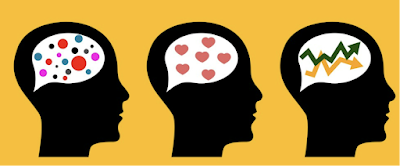I was listening to the radio, a few mornings ago. They were interviewing a scientist who was working towards a cure for disease. He explained how valuable the work was to society, how proud he was to be part of this aim. The entire interview was portraying him as a hero. And, in his field of stopping killer viruses, I would totally agree that there's some heroes.I see the same language, the same aims, the same hero-values, appearing in the quests to 'treat' and 'cure' autistic people. Some groups of scientists, and people who want us to believe they are conducting some sort of science (e.g. some behaviourists), keen to be the hero, to find the cure. Keen to allegedly benefit society, to get that award, to raise that trophy. To share the platform with equally keen parents, who are shaking their hand and crying with relief, giving breathlessly glad interviews to the media about the hero-team that allegedly transformed their child's life...and their family's life.
Using negative language is very much part of that medical-thinking, and the word-cloud at the top of the page here is fairly typical of the wording in endless science papers. Papers from teams looking for ways to erase autistic people from the future. (Well, that's their aim. Let's be quite clear about it. A future without autism in it. No autistic people.) Such negativity sits in stark contrast to the research, e.g. as set out in https://captapnetwork.wordpress.com/2023/09/19/how-to-talk/ We get much further with positives, kind words, affirming words - whilst of course supporting people well.
I can totally understand the pull, the attraction, of that set of cure-beliefs. For nearly 100 years, we had talked about autistic people as nothing more than diseased deficient sub-humans who need curing. The new evidence is accumulating faster than many of us can post it, and pointing to a very, very different reality, though. One where it turns out autistic people generally do not want a cure, and do not want to be normalised. One where many autistic people are explaining that normalisation-enforcement made life worse, not better, for example. Here's a sample informal poll result, from hundreds of autistic people. Did enforced eye contact make their quality of life better? No. Generally not.

Until recently, few teams had thought to ask the autistic people if they wanted a cure. Or, if they wanted an intervention to 'normalise' them. Why? Because of a belief that autistic people lacked insight into how we feel and what we want. Thus, it was always safe to assume that Other People Knew Better Than Us.
Do they? On what evidence? Once we start poking about in the evidence for this alleged 'lack of insight', we find out it was based on guesswork and misunderstanding, not science.
People started asking autistic individuals of all kinds. They started reading what autistic people wrote, or signed, or drew. They started really listening. They started doing big surveys, formal research.
More examples? Sure. Huge modern survey right here: https://autisticnotweird.com/autismsurvey/
Do take a look. In particular, take a look at the difference between the aims of the parents/Clinicians, and the aims of the autistic people. Interesting, eh?
And here, take a look at an impressive challenge to the aims of a lot of the science. This academic paper is from,
"autistic clinicians, therapists, educators and researchers, parents, and family members of autistic people of all ages and with all types of support needs, as well as individuals with high support needs. Among us are also autistic people of color, autistic people from the Global South and Asia, autistic women, and autistic people belonging to gender minorities" https://www.liebertpub.com/doi/pdf/10.1089/aut.2022.0017
So, it's a heck of a gamble, isn't it. We're gambling that the original misunderstandings about autism were in fact right; that autistic people - including those mentioned above - can't possibly know what's right for our own lives. That our lives will be transformed by potion A or intervention B, and we just have to trust the Real Adults in the room.
It's very infantilising, isn't it. Autistic people as eternal children that can never make a decision, unless it's what to have for tea, or what to wear? Very much against Human Rights for disabled people, as set out by the United Nations e.g. https://treaties.un.org/doc/Publication/CTC/Ch_IV_15.pdf
Of course, as the research and surveys show, there are some autistic people who would like a cure. I respect their views. But, I can't help but wonder....a cure for what?
Autism isn't a disease. It's our brain design. There's so much research showing differences in function and responses, from the earliest of ages. A different sensory system. A different communication system. A different way of perceiving the world. What on earth would happen if we 'cured' it? How do we know things would be better? Better for who? How? Something to lessen sensory heck would be greatly appreciated by many, for example, but that's not curing autism. Something to improve focus or daily living skills, perhaps, for some (but have they checked for e.g. co-existing ADHD or dyspraxia? Serious question.)
The old questionnaires about autism 'cures' were based on us being a Bad Behaviour. Was autism ever a behaviour? Or were we only finding distressed autistic people,? People whose very understandable distress-behaviour was because of general pain, overwhelm, bullying, assaults. Or because of undiagnosed medical conditions, exhaustion, boredom, lack of enabled communication, sensory pain, etc etc? So much research shows the lived reality of these things for autistic people, now. None of those are autism's fault. They are choices by society, including the choice not to bother researching autistic pain responses & how to lessen the pain. Or, the choice to portray us as just broken, encouraging others to think badly of us.
Wouldn't it be a better idea to ask the autistic person what they want, & why they are distressed? Wouldn't it be better to do something to support autistic aims and stated needs instead? To work with autistic specialists to find real answers to real problems? To listen deeply, and empathise with autistic lives?
Are a few teams, and some parents, who are questing after a cure/normalisation truly heroes? That's a very philosophical question, and one we could be here debating for a long time. What counts as heroism? Making life even worse for autistic individuals isn't a path to hero status.
For sure, autistic lives - and those of their families - need much, much better understanding and support. Autistic sensory differences need much better accommodations to prevent sensory pain. Autistic communication differences need much better understanding in society. Autistic people need much better protection from predators and bullies. Autistic people are too often left in grinding poverty, with zero support. Autistic people are so often denied education and healthcare, & routinely denied endless other human rights. Will a cure answer these realities?
I am even grateful to endless allies in all spheres, including many parents, many teams, many researchers, many in schools and healthcare facilities etc who are learning, and thinking, and listening, and truly transforming some autistic lives. I want to be clear about this. There are some excellent things now happening. But why has it taken 100 years? Because we were obsessed with thinking about autism just in negative terms.
No wonder some hope for some miracle 'cure' that will allegedly transform people and make all of that negativity go away. Will it? We have no idea. None. We don't know what the side effects of a 'cure' would be. In fact, there's not a lot of research on autistic people that bothers to check for side effects or long term harms (example findings about this: https://journals.sagepub.com/doi/10.1177/13623613221128761 ), or bothers to ask us for consent/assent. See the informal summary at https://annsautism.blogspot.com/2023/01/ethics-and-autism-rights-and.html for example. I wish I was joking.
Let's start asking whether autistic people want a cure, or to be 'normal', eh, before assuming that's the pathway to their wonderful future for them, or a pathway to team heroism?
Thank you for reading.







